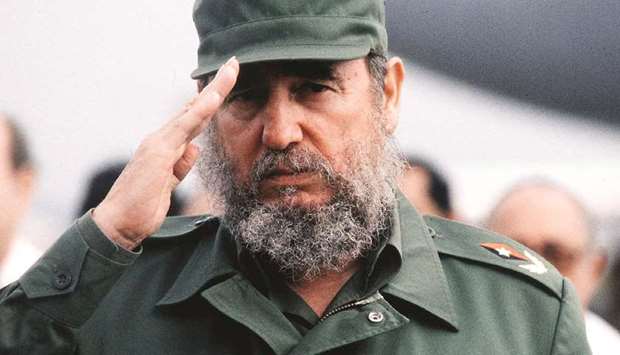This is the story of a charismatic revolutionary who bestrode the world stage for more than half a century. Known as Fidel to friends and enemies alike, his life story is inevitably that of his people and their revolution.
Born on 13th August 1926, Fidel Alejandro Castro Ruz established the first communist state in the Western Hemisphere after leading an overthrow of the authoritarian regime of Fulgencio Batista in 1959. He governed the Republic of Cuba as Prime Minister from 1959 to 1976 and then as President from 1976 to 2008.
Interestingly, while the Cold War supremacy of capitalism vs communism was about the USA and the USSR, the war was never actually fought on their soils, but in smaller nations like Cuba where it was to set up capitalist or communist governments. And, during this time, Castro was a towering personality whose importance and influence was felt far beyond the shores of his small Caribbean island nation.
Seems Fidel had a lot to say! A brilliant orator since his youth, he holds the Guinness Book of Records crown for delivering the longest speech ever at the United Nations. In 1960 he spoke to the General Assembly for four hours and 29 minutes, a record that still stands. He did even better on Feb 24, 1998, after the national assembly re-elected him to a five-year term as president, where he spoke for 7 hours and 30 minutes.
Castro claimed he survived 634 attempts or plots to assassinate him. Some of them were very strange indeed. Two of the oddest revolved around Castro’s passion for scuba diving: one called for an explosive seashell to be planted in an area where he liked to dive, and the other involved a wet suit tainted with a disease-causing fungus and a tuberculosis-laced breathing apparatus that were to be given to him. The funniest one, not actually an assassination attempt, included a powder to make his beard fall out so as to undermine his popularity. Castro famously said, “If surviving assassination attempts were an Olympic event, I would win the gold medal.”
Like his fellow revolutionaries, Castro had little time to shave while operating in the wilds of the Sierra Maestra mountains. The men’s grown-out beards became badges of honour. Long after his guerrilla days, Castro kept his beard as a symbol of the triumph of the revolution. It’s hard to think of a more famous beard than the one Castro wore across seven decades.
A cigar protruding from Castro’s mouth was nearly as much of a signature for him as were his fatigue uniform and beard. Good sense prevailed and this cigar-chomubreping guerrilla fighter gave it up in 1985. “The best thing you can do with this box of cigars is to give them to your enemy,” he summed it up.
Until 2006, when he stepped down, Castro had been the third longest-serving head of state and also the longest-ruling non-royal national leader since 1900 by term length. Only the King of Thailand and Queen Elizabeth of Great Britain had ruled longer.
Despite assassination plots, an invasion, five decades of economic sanctions and cigars, Fidel Castro outlasted nine US presidents, from Eisenhower to Clinton. Castro passed away two years ago, on this day at the age of 90. Castro had chosen not to create a cult of personality. Inside Cuba, there are no streets, buildings, institutions or localities named for him.
Welcome to Nutty’ Infotainment. YAYS! Your time starts NOW!
One of Fidel Castro’s cows, known as Ubre Blanca (translated as White Udder), made it to the Guinness Book of World Records for which incredible feat?
The highest milk yield by a cow in one day – 110 litres (29 US gallons). Castro referred to this cow’s extraordinary output in speeches as evidence of communism’s superior breeding skills.
Name the king after whom Fidel Castro named three of his sons.
Alexander the Great. He named his three sons Alexis, Alejandro, and Alexander.
In 1940, when Castro was a 12-year-old boy, he wrote a letter to President F Roosevelt requesting for something to be sent to him because he had never seen one before. What was it?
$10 bill
Name the book Fidel Castro co-authored with Nelson Mandela.
How Far We Slaves Have Come!
Which popular board game did Fidel Castro promptly ban upon rising to power in Cuba?
Monopoly
In heraldry, what is the shape of a ‘pile’?
Inverted Pyramid
Where would you find Blinky, Pinky, Inky and Clyde?
Pac Man. These are primary group of fictional ghosts who serve as the main antagonists in the Pac-Man franchise.
What was the official and court language of the Mughal Empire?
Persian.
What is Ephebiphobia?
Fear of Youth.

RECORD: Fidel Castro holds the Guinness Book of Records crown for delivering the longest speech ever at the United Nations.
